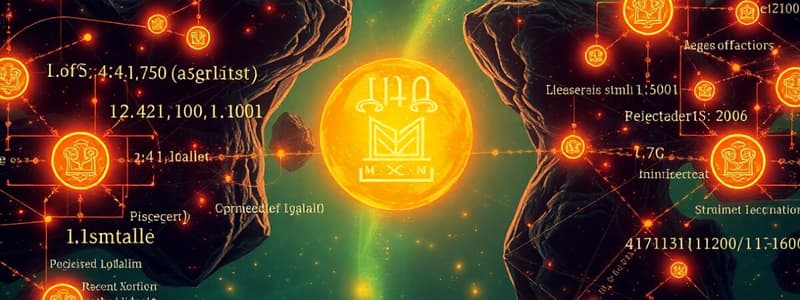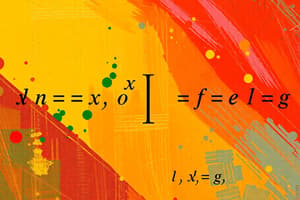Podcast
Questions and Answers
ହାଇପୋଥେଟିକାଲ୍ ଶିଲୋଗିଜ୍ ଦ୍ୱାରା କଣ ସୂଚିତ କରାଯାଇଛି?
ହାଇପୋଥେଟିକାଲ୍ ଶିଲୋଗିଜ୍ ଦ୍ୱାରା କଣ ସୂଚିତ କରାଯାଇଛି?
- ଯଦି p, ତେବେ r (correct)
- ଯଦି p, ତେବେ q (correct)
- ଯଦି q, ତେବେ p
- ଯଦି q ତାହାର ପରେ r
ଡିସଜଙ୍କଟିଭ୍ ସିଲୋଗିଜମ୍ କ'ଣ ତାଲୁକ୍ ରଖେ?
ଡିସଜଙ୍କଟିଭ୍ ସିଲୋଗିଜମ୍ କ'ଣ ତାଲୁକ୍ ରଖେ?
- ପୂର୍ଣ୍ଣ କଥା ଅତ୍ୟାଧିକ କରିବା
- p ସତ୍ୟ ହେଲେ q
- P କିମ୍ବା q (correct)
- q ତେବେ r
ଏଠାରେ କୌଣସି ଫ୍ୟାଲେସୀ ନହିଁ, କାହିଁକି?
ଏଠାରେ କୌଣସି ଫ୍ୟାଲେସୀ ନହିଁ, କାହିଁକି?
- ଅଡ୍ ହୋମିନେମ୍
- ଗତିମାନ କଥା (correct)
- ଫାଲ୍ସ ଡିଲେମା
- ସ୍ଟ୍ର କାମ୍
ଫର୍ମାଲ୍ ଲୋଜିକ୍ କ'ଣ କୌଣସି ଜିନିଷ ଉପରେ ନିର୍ଭର କରେ?
ଫର୍ମାଲ୍ ଲୋଜିକ୍ କ'ଣ କୌଣସି ଜିନିଷ ଉପରେ ନିର୍ଭର କରେ?
ଭୁଲ ମାନିବା ଗୁଣାଙ୍କ ଦେଖାଯାଏ କ'ଣ?
ଭୁଲ ମାନିବା ଗୁଣାଙ୍କ ଦେଖାଯାଏ କ'ଣ?
ଲଜିକ୍ କ'ଣ?
ଲଜିକ୍ କ'ଣ?
ସାଧାରଣ ବିବେଚନାର ବିଶେଷତା କ'ଣ?
ସାଧାରଣ ବିବେଚନାର ବିଶେଷତା କ'ଣ?
କୋଣସି ସଂସ୍ଥାପନା କେବଳ ସତ୍ୟ ସମୟରେ ମିଳିଧାଲା କେଉଁଟା?
କୋଣସି ସଂସ୍ଥାପନା କେବଳ ସତ୍ୟ ସମୟରେ ମିଳିଧାଲା କେଉଁଟା?
ଯଦି ଏହା ସତ୍ୟ ହୁଏ, ତେବେ ଏହା କେବେ ବୁଝ ନାହିଁ?
ଯଦି ଏହା ସତ୍ୟ ହୁଏ, ତେବେ ଏହା କେବେ ବୁଝ ନାହିଁ?
ଧୈର୍ଯ୍ୟର ତାତ୍ତ୍ୱିକ ସୂତ୍ର କ'ଣ?
ଧୈର୍ଯ୍ୟର ତାତ୍ତ୍ୱିକ ସୂତ୍ର କ'ଣ?
ବିଗତ ସମୟରେ ଯାଞ୍ଚ ନହେଲେ କଣସବୁ?
ବିଗତ ସମୟରେ ଯାଞ୍ଚ ନହେଲେ କଣସବୁ?
ଦ୍ୱାରା ବାଧ୍ୟକରେ ସଠିକ କ'ଣ?
ଦ୍ୱାରା ବାଧ୍ୟକରେ ସଠିକ କ'ଣ?
ସମଗ୍ରୀର ସତ୍ୟ ଛୋଟ କ'ଣ?
ସମଗ୍ରୀର ସତ୍ୟ ଛୋଟ କ'ଣ?
Flashcards
ତର୍କ କଣ?
ତର୍କ କଣ?
ତର୍କ ହେଉଛି ସତ୍ୟ ଯୁକ୍ତିର ଅଧ୍ୟୟନ। ଏହା ସଠିକ୍ ଅନୁମାନ ଏବଂ ବିବାଦର ସିଦ୍ଧାନ୍ତଗୁଡିକର ଯାଞ୍ଚ କରେ।
କଥନ କ’ଣ?
କଥନ କ’ଣ?
କଥନ ହେଉଛି ଏକ ଘୋଷଣାମୂଳକ ବାକ୍ୟ ଯାହା ସତ୍ୟ କିମ୍ବା ମିଛ ହୋଇପାରେ।
ସାଧାରଣ କଥନ
ସାଧାରଣ କଥନ
ସାଧାରଣ କଥନ ହେଉଛି ଏକ କଥନ ଯାହାକୁ ଛୋଟ କଥନକୁ ବିଭାଜିତ କରାଯାଇପାରିବ ନାହିଁ।
ସଂଯୁକ୍ତ କଥନ କ’ଣ?
ସଂଯୁକ୍ତ କଥନ କ’ଣ?
Signup and view all the flashcards
‘ଏବଂ’ କଥନ କ’ଣ?
‘ଏବଂ’ କଥନ କ’ଣ?
Signup and view all the flashcards
‘କିମ્બା’ କଥନ କ’ଣ?
‘କିମ્બା’ କଥନ କ’ଣ?
Signup and view all the flashcards
‘ଯଦି ... ତେବେ’ କଥନ କ’ଣ?
‘ଯଦି ... ତେବେ’ କଥନ କ’ଣ?
Signup and view all the flashcards
ସତ୍ୟ ସାରଣି କ’ଣ?
ସତ୍ୟ ସାରଣି କ’ଣ?
Signup and view all the flashcards
କେତେକ ସ୍ୱରୂପର ସିଲୋଗିଜମ୍
କେତେକ ସ୍ୱରୂପର ସିଲୋଗିଜମ୍
Signup and view all the flashcards
ବିଚ୍ଛିନ୍ନ ସିଲୋଗିଜମ୍
ବିଚ୍ଛିନ୍ନ ସିଲୋଗିଜମ୍
Signup and view all the flashcards
ମନୋଭାବଜନିତ ତ୍ରୁଟି (Ad hominem)
ମନୋଭାବଜନିତ ତ୍ରୁଟି (Ad hominem)
Signup and view all the flashcards
କୃତ୍ରିମ ବାଧା (Straw man fallacy)
କୃତ୍ରିମ ବାଧା (Straw man fallacy)
Signup and view all the flashcards
ଫର୍ମାଲ ଲଜିକ୍ କ'ଣ?
ଫର୍ମାଲ ଲଜିକ୍ କ'ଣ?
Signup and view all the flashcards
Study Notes
Introduction to Logic
- Logic is the study of valid reasoning, examining principles of correct inference and argumentation.
- Logic distinguishes between sound and unsound arguments.
- Logic is crucial in mathematics, philosophy, computer science, and law.
Types of Statements
- Statements are declarative sentences, either true or false.
- Simple statements cannot be broken down into smaller statements.
- Compound statements combine two or more simple statements using logical connectives (e.g., and, or, if...then).
- Examples of logical connectives:
- AND: True only if both component statements are true.
- OR: True if at least one component statement is true.
- NOT: Reverses the truth value of the component statement.
- IF...THEN: True unless a true statement leads to a false statement.
Logical Operators
- Negation: The opposite truth value of a statement (denoted by ¬ or ~).
- Conjunction: "And" (denoted by ∧).
- Disjunction: "Or" (denoted by ∨).
- Conditional: "If...then" (denoted by →). The "if" part is the hypothesis, the "then" part is the conclusion. A conditional statement is false only when the hypothesis is true and the conclusion is false.
- Biconditional: "If and only if" (denoted by ↔). True when both component statements have the same truth value.
Truth Tables
- Truth tables determine compound statement truth values for all possible component truth value combinations. They are essential for analyzing argument validity.
- A well-constructed truth table produces consistent results matching the logic operators.
Arguments and Validity
- Arguments are sets of statements (premises) supporting a conclusion.
- Deductive arguments aim to provide conclusive support for the conclusion; if premises are true, the conclusion must be true.
- Inductive arguments provide probable support for the conclusion; the conclusion is likely, but not guaranteed, if premises are true.
- Validity: In a deductive argument, validity means the conclusion logically follows the premises, regardless of premise truth. A valid argument with true premises is sound.
Types of Deductive Arguments
- Modus Ponens: If p, then q. P. Therefore, q.
- Modus Tollens: If p, then q. Not q. Therefore, not p.
- Hypothetical Syllogism: If p, then q. If q, then r. Therefore, if p, then r.
- Disjunctive Syllogism: P or q. Not p. Therefore, q.
Fallacies
- Fallacies are errors in reasoning leading to invalid arguments.
- Examples of common fallacies:
- Ad hominem: Attacking the person, not the argument.
- Straw man: Misrepresenting an argument to attack it easily.
- Appeal to authority: Claiming something's true because an authority said it.
- False dilemma (either/or fallacy): Presenting only two options when more exist.
Formal Logic
- Formal logic uses symbolic representations of arguments.
- Quantifiers express how many items in a category meet a condition.
- Universal quantifier (∀): For all.
- Existential quantifier (∃): There exists.
Informal Logic
- Informal logic evaluates natural language arguments, identifying strengths and weaknesses without rigid rules.
- Critical thinking evaluates and analyzes arguments, separating good reasoning from poor reasoning.
Applications of Logic
- Logic is used in mathematics (proofs), computer science (programming), philosophy (evaluating arguments), law (reasoning), and everyday life (assessing arguments, problem-solving).
Studying That Suits You
Use AI to generate personalized quizzes and flashcards to suit your learning preferences.




